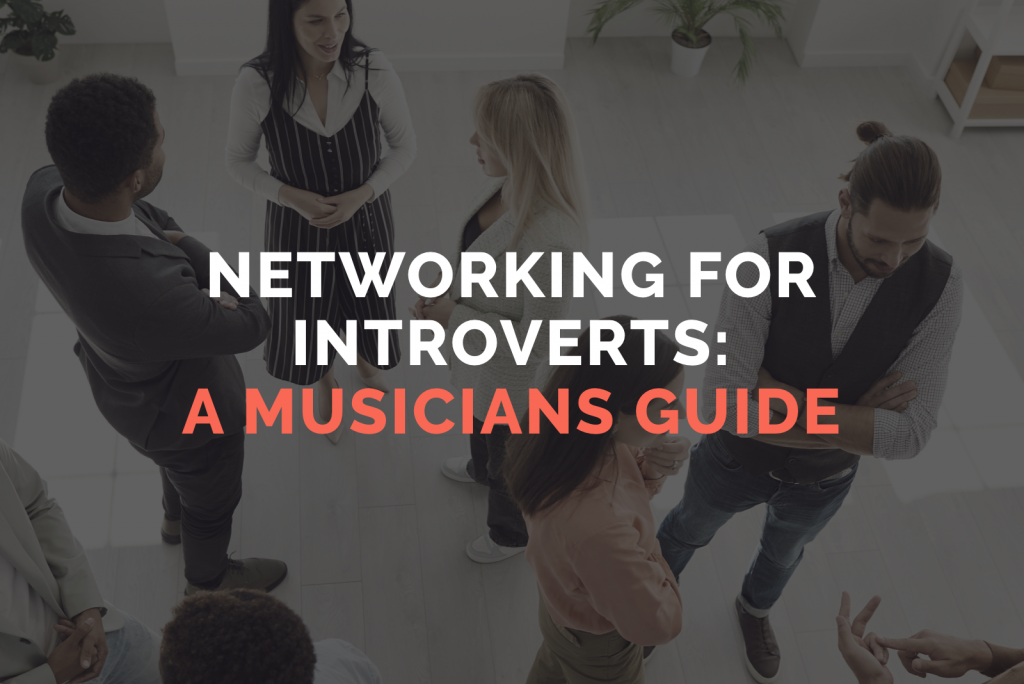Networking For Introverts: A Musicians Guide
I am a hard-core introvert and used to find the whole idea of networking rather terrifying. There were many times I would be outside a venue taking deep breaths, trying to summon up enough courage to step inside the building and start conversing with total strangers.
Over the past five years, I have invested considerable time and effort into improving my skills in this area, and from my experience, I can confidently say that success at networking events is indeed attainable for people like us. Social skills are just that, SKILLS. Skills that like anything else require practice and if you’re open to the learning curve, I promise you will improve and see positive results.
Here are a few things I have learnt on my journey thus far.
DON’T BE AFRAID TO BE YOURSELF
Yes, that’s right. Be your authentic self. Own who you are and don’t apologize for it. No one is perfect, and I found that by being myself gave others permission to do the same, which immediately put us both at ease.
Pretending to be something I wasn’t created more anxiety within me and gave others a false impression of who I am. Learning how to converse has taken a lot of work on my part, but it all started with me being unafraid to be myself. Remember that social skills do not define who you are and as I mentioned earlier, it’s just another skill that takes time to develop.
YOU AREN’T ALONE IN HOW YOU FEEL
You may be surprised to know that there are many other people at networking events who feel exactly the same way you do.
I remember chatting to an extroverted friend of mine who is incredibly good at conversing with others, especially people he is meeting for the first time. I told him how envious I was of his social skills, at which he replied:
“The thing you need to realize is that I feel as awkward and uncomfortable as you do in social settings, but my way of feeling less anxious is to dive in and get to know people as quickly as possible.”
After this conversation, I was surprised to learn that other extroverted friends of mine also admitted to feeling uncomfortable and awkward at such events. This was a real revelation to me, as I genuinely thought I was the only one having a difficult time.
Kindness is a powerful tool that can be used to your advantage in these situations. Be kind to yourself and others. Show them by example that it’s ok for them to be themselves. Know that the person you are talking to may well feel exactly how you do on the inside, they’re just very good at hiding it.
ATTRACTING THE RIGHT PEOPLE
It helped me to know that I’m not trying to connect with absolutely everyone. My goal is to meet the right people. For me, the ‘right people’ are those who are authentic, passionate about their work and who I can see myself forming a long-term relationship with. I also tend to gravitate towards people who are kind and easy to talk to. Due to being wrapped up in our social anxiety, we forget that this is a two-way street. Other people have to make you feel at ease and vice versa. If something seems off or you’re not gelling with someone, know that it’s ok. Don’t take it personally. I tend to truly connect with only a handful of people, but those connections are ones that I know will last. Remember, it’s about quality over quantity.
CREATE TIME TO RECUPERATE
As an introvert, social interactions are often very draining for me, so it is imperative that I create time to recuperate afterwards. I found out the hard way that by not doing this I suffered both emotionally and physically. Be sure to factor in whatever recovery time you may need.
BACK-POCKET QUESTIONS
This was a total game changer for me. I learned this skill from a book called Emotional Intelligence 2.0 by Travis Bradberry & Jean Greaves, which I highly recommend.
The idea behind this is to have a set of 3-4 questions that you could ask someone in a multitude of settings. A classic one if you are at a party, is asking one of the guests how they know the host. Another great one is asking someone about their work. With each question, you should ask a follow up question, and then give your thoughts on what the person is saying, so the pattern goes: back pocket question, follow up question, your input. Having a structure like this in place helped me enormously when meeting new people.
The book also says to listen very carefully to each word the person is saying. I think of this as being like the principles of Zen Buddhism, where you focus your attention on something so intensely that you forget about everything else. I found that when I listened carefully to each and every word, I focused less on my anxiety and more on the information being imparted to me. It sounds simple but it’s very effective.
PRACTICE, PRACTICE, PRACTICE.
Use any chance you get to improve your skills, even if it’s just ordering something at a coffee shop. A while ago I set myself the challenge of making small talk with whoever was behind the counter. Initially it was incredibly awkward and weird, but now I do it without even thinking.
Also, remember to be kind to yourself. This is a learning curve, and it takes time to get your skills up to scratch. But I promise if you put in the time, you’ll get there.

